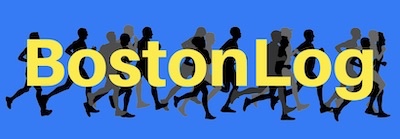Like most avid marathon runners, I’ve always dreamed of running the most prestigious marathon race in the world: the Boston Marathon. I first qualified when I was a medical student nearly eleven years ago, but was afraid of requesting time off from my third-year clinical rotations to run it. For the following ten years I’ve always regretted never asking.
Since joining Kaiser Permanente, an institution that values an employee’s health and well-being via a strong work-life balance, I’ve been able to achieve qualifying for the Boston Marathon again. Ten years later, in 2014, I ran the post-bombing marathon in a personal record time and shared in showing the world how a terrorist act would never dissuade the spirit of our running community.
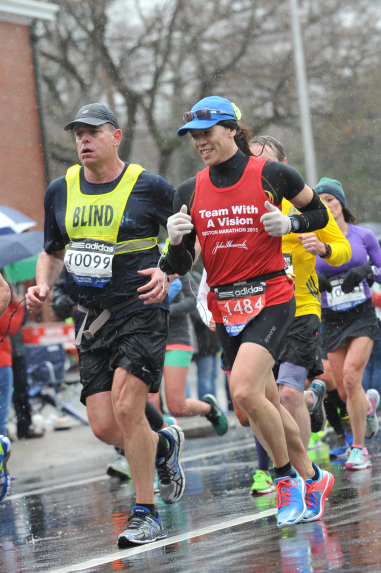
In 2015, after having to take nearly a half-year hiatus from training due to plantar fasciitis and Achilles tendonitis, I knew in running Boston I would not get close to the time I achieved the previous year. In fact, I wasn’t even sure if I should be running at all, since I was still recovering and had run for only a couple of weekends prior. When I asked my orthopedic surgeon and physical therapist if I should run Boston, they answered with silence and that special smirk that implied they knew I would run it anyway if they said no.
With this knowledge, I knew I needed a good reason to justify putting my body through 26.2 miles of suffering again, and I found it in the Massachusetts Association for the Blind and Visually Impaired’s (MABVI) “Team with a Vision.” I remembered seeing a running duo tethered to each other by a string, with one athlete wearing a large bib that said “Guide” and the other wearing one that said “Blind.” I was amazed by the feat of athleticism a visually impaired runner could achieve despite the odds against him or her to train to the level required to qualify to run Boston.
It took me eleven years to finally get there, with months of intense training while carefully navigating the hills, pot holes, crazy drivers, and in at least one instance a pack of wild dogs in Riverside, California. I could not imagine doing this, or even just surviving my training, without my sight. But here was an amazing athlete with his selfless guide, who gave up running a personal time on probably one of the biggest races of his life, to help another achieve his goal.
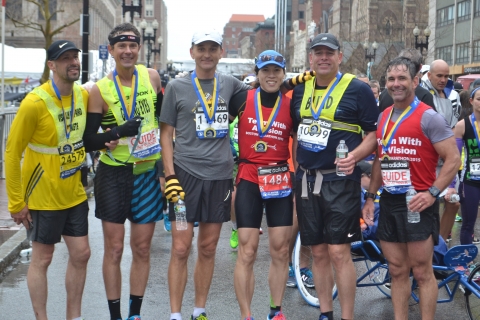
As a vitreoretinal surgeon, I work with the visually impaired on a daily basis, many of whom grapple with the recent loss of vision current medical treatments can’t return. They and their families have to deal with the devastating emotional and psychological aspects of losing their independence and ability to do simple everyday activities most of us take for granted. I knew if I could volunteer to work with Team with a Vision, it would give me the opportunity to learn and share the stories of visually impaired individuals who did not let their disability limit them from achieving their goals. It would empower me with hope I could give to my patients.
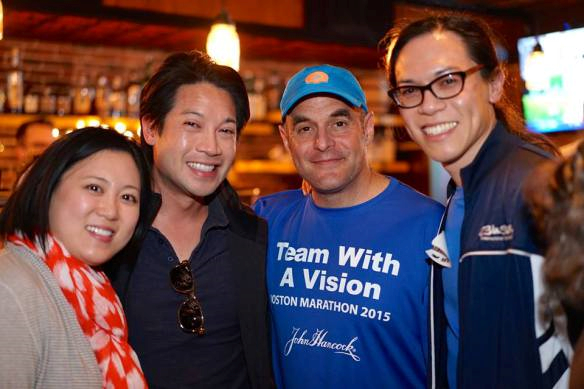
After googling “blind guide Boston marathon,” I was directed to a radio segment from “The Moth” on National Public Radio with guest Peter Sagal, who is the host of NPR’s “Wait, Wait, Don’t Tell me…” describing his personal experience being a guide for MABVI’s Team With a Vision. His entertaining personal recounting inspired me to want to volunteer immediately. What better way to combine my passion for working with the visually impaired and my love of running then to be a guide for a visually impaired runner at the Boston Marathon! Half expecting MABVI would tell me they didn’t need my help since it was only a week out from the race, the Team Coordinator Josh Warren got back to me immediately with an invitation, knowing that as a vitreoretinal specialist, I could bring something unique to the team. Regardless of my level of training at this point, I knew nothing was going to keep me from running Boston again with a new level of enthusiasm that even rivaled my experience in 2014.
Boston marathon weekend could not come soon enough as I made the flight out while still wearing my orthopedic boot – causing everybody at the Marathon Expo to give me second looks, no doubt wondering if I was serious about running. I finally met the visually impaired runner I would be guiding, Richard Hunter, along with his primary guide (with whom he’d been training in Northern California) Dan Streetman.
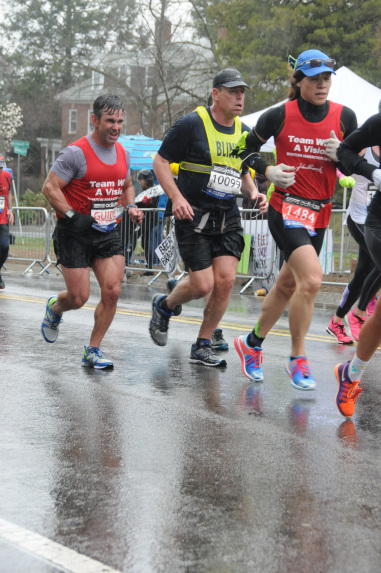
Richard Hunter is a remarkable individual who began losing his sight in 2007 from Retinitis Pigmentosa, which has slowly left him with only hand motion vision. In talking with him, I learned Richard is a former commissioned officer in the Marines, an ultra-marathoner, and an Ironman athlete who had recovered from a broken neck, several facial fractures, and a serious concussion from a cycling accident sustained while training just a year and a half prior. One might assume somebody facing such adversity would give up or take it easy, but not Richard! Rather, he used these “road bumps” to energize himself further to organize the National Marathon Championships for the Visually Impaired at the California International Marathon (CIM). He also launched a website with MABVI called “United in Stride” (http://unitedinstride.com), a resource which pairs visually impaired runners with volunteer guides across the nation. I was now getting concerned I couldn’t keep up with this guy during the race!
Well, the morning of the race finally came… along with rain, headwinds, and temperatures in the 30-40s. Dan, Richard, and I worked out a running strategy where Dan would run tethered to Richard and monitor Richard’s heart rate and pace while I would be the “rabbit,” running back and forth between aid stations to get them water and Gatorade so they could avoid the crowd congestion at the stations.
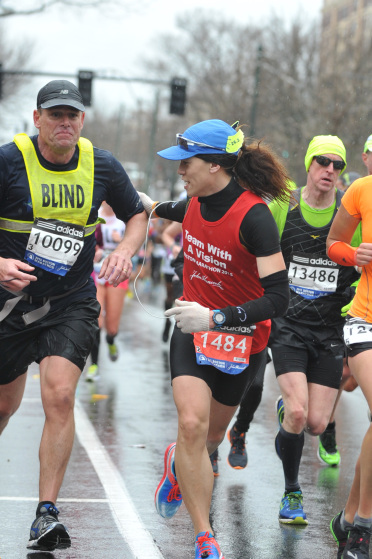
In addition, because Richard was so fast, we kept passing runners during the course. This required me to run ahead to gently nudge people to the side, effectively clearing a course for them to run unimpeded side-by-side. It was also a fun opportunity to strike up friendly conversations with runners who didn’t budge as a way to disinhibit them and allow me to redirect them to the side without realizing what I was doing. In fact, it was such an effective strategy to “slice” through the field of runners, that Iraqi Army War Vet Dan Streetman and former Marine Richard Hunter christened me with the call sign “Scalpel”; a great honor, and in some ways even bigger than attaining that Boston Finisher Medal!
Three hours, twenty-one minutes and twelve seconds later, we crossed the finish line side-by-side, getting Richard a personal record for the Boston Marathon despite the awful race conditions. While I was sore, freezing cold, drenching wet, and limping from my angered Achilles and plantar, I was walking on air after being a part of such an amazing experience. Running a marathon was no longer just a physical exercise to achieve a personal goal; it was also a way, as Peter Sagal described it, to “exercise my soul” and experience first-hand that for those who are visually impaired, anything is possible.
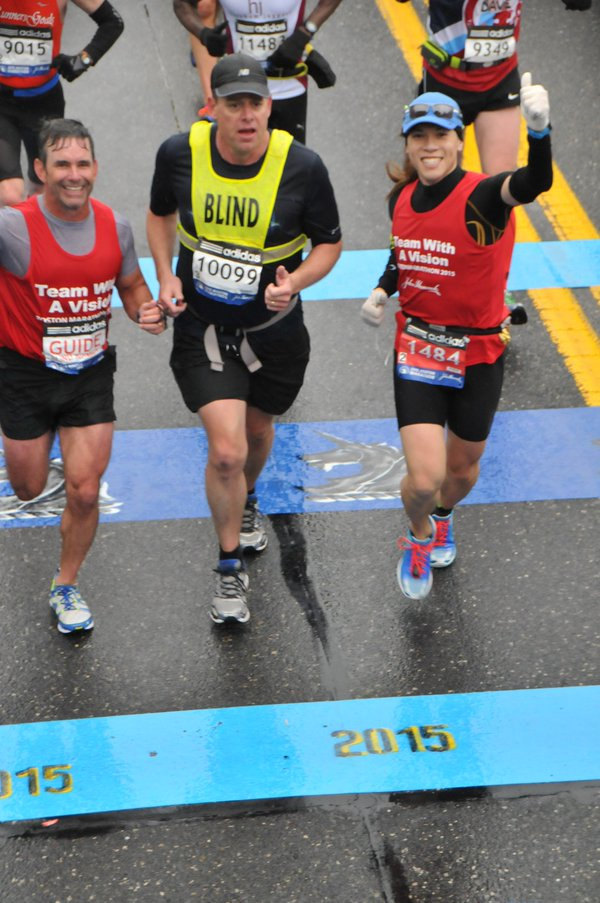
Dr. Vincent Hau,
Yorba Linda, California
April 18, 2016
Age – 40
Bib # 2348
4:08:02
Vitreoretinal physician and surgeon at the Kaiser Permanente Riverside Medical Center.
